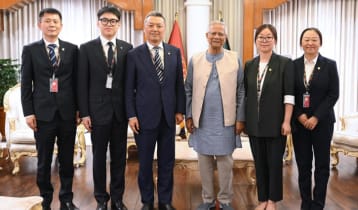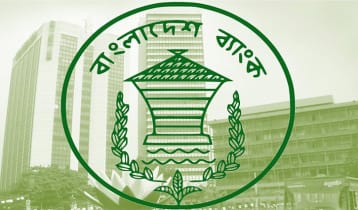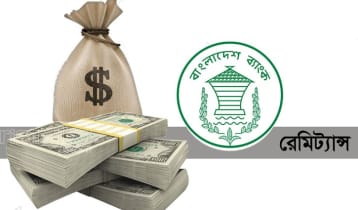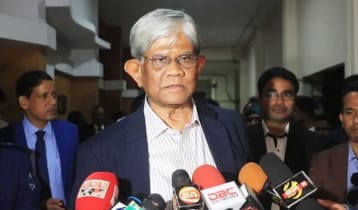Argentine businessmen urged to invest in Bangladesh
Diplomatic Correspondent || risingbd.com
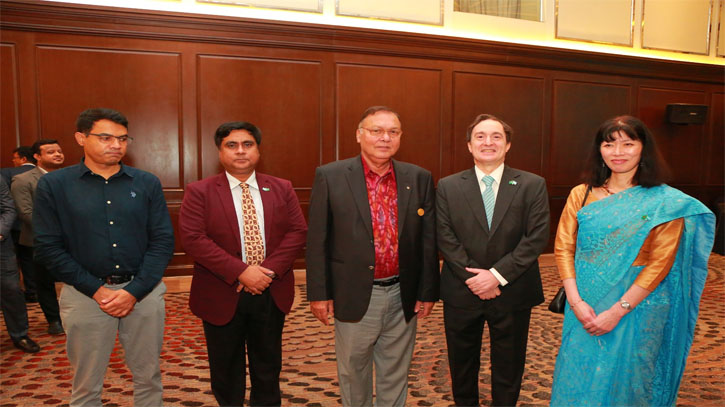
Bangladesh is projected to become the 25th largest economy by the first half of the 2030s as the country is now the world's 35th largest economy with a GDP of USD 460 billion.
Agriculture Minister Dr Mohammad Abdus Shahid said this while speaking as the guest of honour at the National Day Reception of the Argentine Republic at Le Meridien Hotel in the city on Tuesday.
Politicians, diplomats, business leaders, civil and military bureaucrats, members of the civil society and media personalities attended the reception.
“As you are aware, Bangladesh is now well on the track to graduate from the UN LDC in 2026. This country of nearly 170 million people achieved this through their sheer hard work and unflinching commitment. Under the prudent leadership of Prime Minister Sheikh Hasina, the government has been working relentlessly towards transforming Bangladesh into a "Smart Bangladesh" , a happy, prosperous, knowledge-based, industrially developed nation by 2041,” the minister said.
Just before the global pandemic, the economy reached a growth rate of 8.15 per cent. Bangladesh’s per capita income has now reached USD 2,824, with a threefold rise in one decade. The export volume has exceeded to USD 60 plus billion- mark. Bangladesh is among the world's top ten remittance earning countries.
“As Bangladesh has been making significant strides in infrastructure development through landmark projects like building the Padma bridge, Karnaphuli Tunnel, expanding expressways and railroads, constructing metro rail, building deep seaports as well as modernizing land ports, airports and seaports, among others, to turn Bangladesh into a connectivity hub, we are announcing our readiness to receive business partners from all corners of the globe. We welcome Argentine investors to join us in our journey towards a developed and smart society by 2041 as envisioned by Prime Minister Sheikh Hasina,” the minister said
“The bilateral engagements between Bangladesh and Argentina have grown over the last few years and we may look at a potential windfall in terms of business collaboration. Bangladesh's export to Argentina accounts for only 0.1% of the Argentinean import whereas Argentina is the 7th largest import source for Bangladesh” the minister said.
In FY 2021-22, Bangladesh's export to Argentina stood at 18 million US dollars while the import figure stood at 791 million US dollars. But this may only be the tip of a potential iceberg.
“Bangladesh and Argentina may be geographically far off, but our shared ethos and values, aspirations and dedication to progress and advancement, and our collective stakes on issues of mutual interest have brought us closer and forged an enduring bridge of fraternity. Tonight, as we gather around this event, we have the opportunity to strengthen the ties that bind us and explore new avenues for collaboration and partnership that goes beyond politics and diplomacy. The reopening of the Argentine mission in Bangladesh and this celebration of National Day of the Argentine Republic will provide a platform for us to deepen this relationship further”, he said.
Meanwhile, Argentine Ambassador in Dhaka Marcelo Carlos said that the people-to-people relations of the two countries can be strengthened through the exchange of sports and culture.
Mentioning that Bangladesh's support to Argentine football is very encouraging to Argentine footballers, he said that his country is interested in increasing investment in various fields including sports and culture.
Meanwhile, Bangladesh and Argentina last year signed a memorandum of understanding for the first time for bilateral cooperation in the field of agriculture.
Under the MoU, Bangladesh will receive priority in smart agriculture technical support, including the import of wheat and soybeans.
The signing of this MoU is expected to facilitate cost-effective imports of these key commodities, fostering greater agricultural trade and collaboration.
The MoU outlines potential areas of cooperation, including climate-smart technology, soil management, precision agriculture, irrigation management, post-harvest wastage prevention, good agricultural practices (GAP), marketing of agricultural products, and value chain development.
Hasan/Mukul





